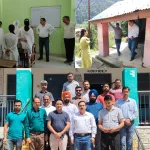Dr. ARIF HABIB
In adults, much of what is known about the organization of language functions in the brain has come from the study of patients with focal brain lesions. It has been known for hundreds of years that a left-hemisphere injury to the brain is more likely to cause language disturbance—aphasia—than a right hemisphere injury, especially but not exclusively in right-handed persons. For about a hundred years, certain areas in the adult left hemisphere—Broca’s area in the posterior frontal lobe, and Wernicke’s area in the temporal lobe—have been identified as centrally involved in language functions. However, researchers in the field of adult aphasia are divided over the exact role these brain areas play in language processing and production.
Damage to Broca’s area results in marked problems with language fluency; with shortened sentences, impaired flow of speech, poor control of rhythm and intonation (known as prosody); and a telegraphic style, with missing inflections and function words. In contrast, the speech of Wernicke’s aphasics is fluent and often rapid, but with relatively empty content and many neologisms (invented words) and word substitutions. It was initially believed that the two areas were responsible for output (Broca’s) versus input (Wernicke’s), but research does not confirm such a simple split.
Other theories ask whether the two areas might be differentially involved in syntax versus semantics, or phonology versus the lexicon, but the picture is not clear. Some have argued that adult aphasic patients, once they are stable after their injury or stroke, employ many compensatory devices that conceal or disguise the central character of their language difficulties. It then becomes more difficult to assess what is missing or disturbed because the difficulties are overlaid by new strategies, and perhaps new areas of the brain taking over functions for the damaged areas.
Infants and young children who suffer focal brain lesions in advance of acquiring language provide valuable information to neuroscientists who want to know how “plastic” the developing brain is with respect to language functions. For instance, is the left hemisphere uniquely equipped for language, or could the right hemisphere do as well? What if Broca’s or Wernicke’s areas were damaged before language was acquired? Thirty years ago a review of literature on children who had incurred brain lesions suggested that, unlike the case of adults, recovery from language disruption after left-brain damage was rapid and without lasting effect. Researchers concluded that the two hemispheres of the brain were equipotential for language until around puberty, and that this allowed young brain-damaged children to compensate with their undamaged right hemisphere.
However, several studies suggested that left-brain damage caused greater disruption to language than right- sided damage even in the youngest subjects. Children known to be using only their right hemisphere for language (because they had undergone removal of the left hemisphere for congenital abnormalities) demonstrated subtle syntactic deficits on careful linguistic testing, but the deficits failed to show in ordinary conversational analysis. Almost all of these studies were retrospective, that is, they looked at the performance of children at an older age who had suffered an early lesion.
Furthermore, the technology for scanning the brain and locating the lesion site, then carefully matching the subjects, was much less developed. With the invention of new technologies including CT scans and Magnetic Resonance Imaging (MRI), several studies have been conducted to look prospectively at the language development of children with focal, defined lesions specifically in the traditional language areas.
(Author is a child psychologist and researcher)





